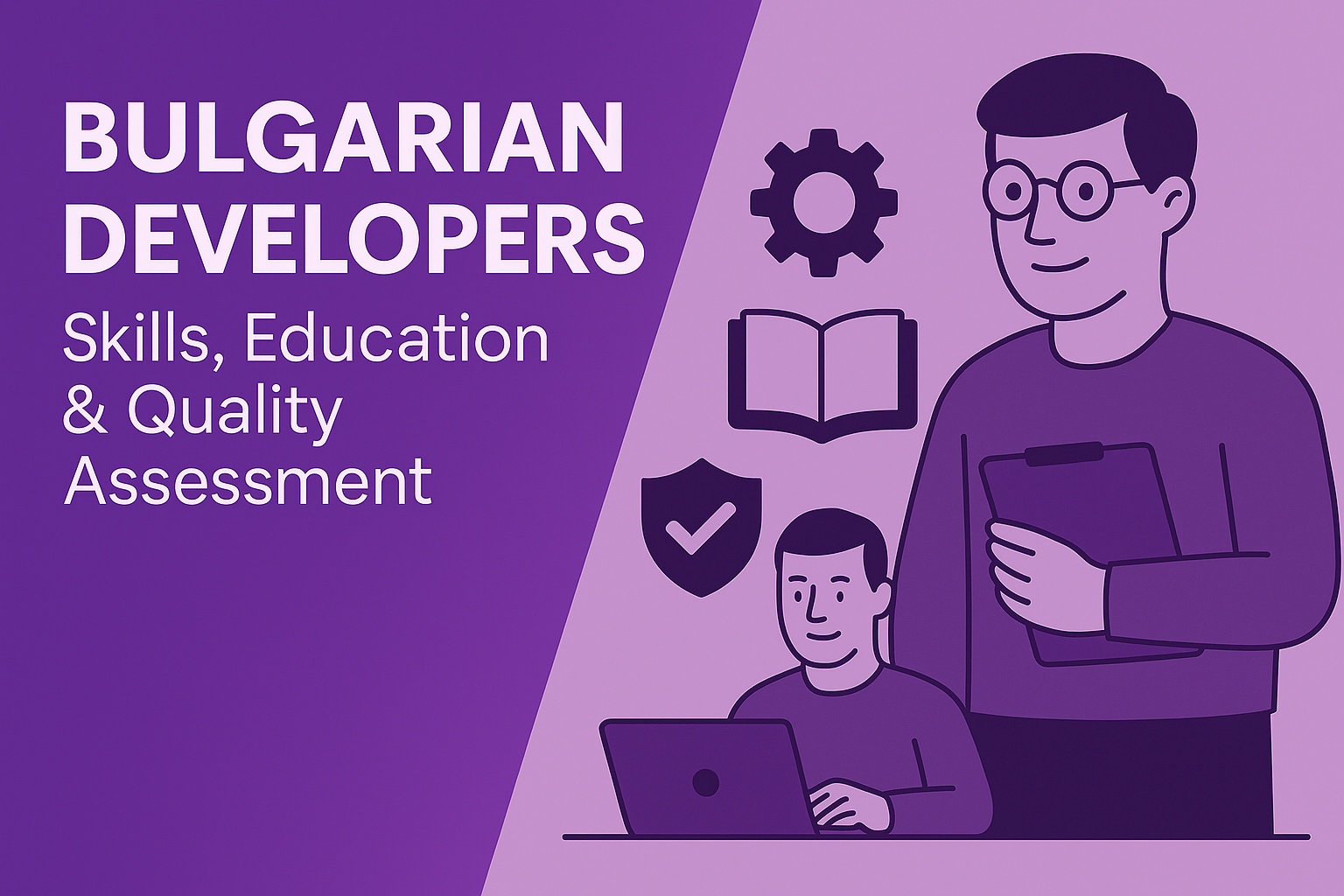The European it outsourcing market has evolved dramatically, with Eastern Europe emerging as the world's premier destination for high-quality, cost-effective technology partnerships. According to Statista's IT Outsourcing Market analysis, the European IT outsourcing market reached €47 billion in 2024, growing at 8.2% annually.
Companies across industries are discovering what many have known for years: Eastern European countries combine Western business practices with competitive pricing, exceptional technical skills, and cultural alignment that makes collaboration seamless. This comprehensive guide examines why businesses are opting to outsource to Eastern Europe, with a particular focus on emerging hubs such as Bulgaria.
Eastern Europe IT Outsourcing at a Glance
Strong Educational Foundation
Eastern European countries have invested heavily in technical education over several decades. The region's computer science and engineering programs emphasize strong mathematical foundations and systematic problem-solving approaches. Many universities maintain partnerships with technology companies, providing students with practical experience alongside theoretical knowledge.
Countries like Poland, Czech Republic, and Bulgaria produce thousands of computer science graduates annually, creating a steady talent pipeline for the technology sector.
Cost-Effectiveness with Quality
Outsourcing it eastern europe offers significant cost advantages compared to Western European and North American alternatives. While exact savings vary by project type and provider, companies typically achieve meaningful cost reductions without sacrificing quality.
Regional salary levels reflect local economic conditions rather than compromised standards, creating sustainable partnerships that benefit both clients and providers.
Operational Advantages
Time Zone Compatibility: Eastern European countries operate within European time zones, enabling real-time collaboration with European clients and reasonable overlap with North American business hours.
Cultural Alignment: Shared European business practices and work cultures facilitate smooth collaboration. Most Eastern European professionals are familiar with Western project management methodologies and quality expectations.
Language Skills: English proficiency levels in professional settings are generally high across the region, particularly among younger developers and in urban tech centers.
EU Membership: Most major Eastern European countries are EU members, providing regulatory alignment and business law consistency with other European markets.
Major Eastern European IT Outsourcing Destinations
Poland: The Regional Leader
Poland has established itself as Eastern Europe's largest IT outsourcing market. Major international companies including Google, Microsoft, and IBM have established development centers in Polish cities.
Key Characteristics:
- Major Cities: Warsaw, Krakow, Wrocław, Gdansk
- Strengths: Large talent pool, mature business environment, strong in fintech and gaming
- Industries: Financial services, gaming, enterprise software
- Infrastructure: Well-developed tech parks and business centers
Warsaw serves as a major fintech hub, while Krakow has become known for its large concentration of international development centers. The country's gaming industry has produced several internationally successful titles.
Czech Republic: Innovation Hub
The Czech Republic, particularly Prague, has developed a reputation for innovation and high-quality software development. The country's strategic location in Central Europe and strong business connections with Germany create additional advantages.
Key Characteristics:
- Major Hub: Prague
- Strengths: Innovation focus, German market connections, enterprise software expertise
- Industries: Enterprise software, IoT, automotive technology
- Advantages: Central European location, multilingual capabilities
Bulgaria: Emerging Opportunity
Bulgaria represents one of Eastern Europe's fastest-growing tech markets. The country offers competitive costs while maintaining EU standards and regulatory compliance.
Key Characteristics:
- Major Hub: Sofia
- Strengths: Competitive pricing, rapid growth, EU membership
- Industries: Custom software development, mobile applications
- Growth Factors: Government support, emerging startup ecosystem
Sofia's tech scene has grown rapidly, attracting both international companies and fostering local startups. The Bulgarian government has implemented various initiatives to support technology sector development.
Based on regional trends we've observed, Bulgaria offers particularly strong value for companies seeking to establish scalable development partnerships.
Romania and Hungary
Romania has developed strong capabilities in enterprise software development, with Bucharest serving as a regional center for complex system integration projects.
Hungary leverages its strong connections to German and Austrian markets, making it attractive for companies serving Central European regions. Budapest offers a sophisticated business environment and strong multilingual capabilities.
Technology Capabilities and Expertise
Eastern European developers demonstrate proficiency across modern technology stacks and development methodologies.
Core Technology Skills
Frontend Development: Strong capabilities in React, Angular, Vue.js, and other modern JavaScript frameworks. Regional developers often demonstrate good understanding of responsive design and user experience principles.
Backend Development: Extensive experience with .NET, Java, Python, and Node.js. Many developers have enterprise-level experience with complex system architectures.
Mobile Development: iOS and Android development capabilities, with growing expertise in cross-platform frameworks like React Native and Flutter.
Cloud Technologies: Increasing familiarity with AWS, Azure, and Google Cloud Platform, though levels vary by provider and region.
DevOps Practices: Growing adoption of modern CI/CD practices, containerization, and infrastructure automation.
Industry Specializations
Financial Technology: Several Eastern European countries have developed strong fintech capabilities, particularly in payment processing, digital banking, and regulatory compliance solutions.
Enterprise Software: Long tradition of developing complex business applications and system integration solutions for large organizations.
Gaming: Poland in particular has established itself as a major gaming development center, with several internationally successful studios.
E-commerce: Growing expertise in online retail platforms and related technologies.
Remote developers eastern europe have proven effective across these specializations, with many companies successfully managing distributed teams for complex projects.
Implementation Best Practices
Partner Selection Approach
Technical Assessment: Evaluate both current capabilities and learning capacity through portfolio review, technical discussions, and trial projects where appropriate.
Communication Evaluation: Assess team communication styles, English proficiency levels, and cultural fit through direct interaction.
Process Maturity: Review project management approaches, development methodologies, and quality assurance practices.
Business Stability: Consider company background, client references, and long-term viability.
Cultural Fit: Evaluate alignment with your organization's work culture and communication preferences.
From our experience working across the region, communication effectiveness and cultural compatibility often prove more important than technical skills alone for long-term partnership success.
Project Management Considerations
Communication Structure: Establish clear communication rhythms that accommodate time zone differences while maintaining project momentum.
Methodology Alignment: Most Eastern European teams are familiar with Agile methodologies, though specific implementation approaches may vary.
Quality Assurance: Define clear acceptance criteria and testing approaches that work across distributed teams.
Documentation: Establish comprehensive documentation standards to support effective collaboration.
Cost Considerations and Planning
Understanding Cost Structures
Development rates in Eastern Europe are generally lower than Western European and North American alternatives, though exact savings depend on many factors including:
- Project complexity and requirements
- Team seniority and specialization levels
- Provider location and overhead structure
- Contract terms and engagement model
-
Total Cost Planning
Beyond hourly development rates, consider:
- Project management and coordination costs
- Communication and collaboration tool expenses
- Travel and relationship-building investments
- Legal and contract development costs
Long-term Value Considerations
Companies achieving the best outcomes typically focus on value optimization rather than pure cost minimization, considering factors like:
- Development quality and maintainability
- Team productivity and efficiency
- Partnership scalability and flexibility
- Knowledge transfer and capability building
Risk Management
Common Challenges
Communication Coordination: Managing effective communication across time zones and cultural differences requires structured approaches.
Quality Alignment: Ensuring quality standards match expectations without excessive oversight.
Scope Management: Preventing scope creep and requirement misunderstandings in distributed environments.
Team Integration: Building effective working relationships across geographical and cultural boundaries.
Mitigation Strategies
Thorough Planning: Invest adequate time in requirement definition, team selection, and process establishment.
Gradual Scaling: Consider starting with smaller projects to build understanding and trust before expanding scope.
Regular Reviews: Implement systematic review processes for both project progress and relationship development.
Cultural Investment: Invest in understanding regional business cultures and communication preferences.
Future Trends and Considerations
Market Evolution
The Eastern European IT outsourcing market continues evolving, with several notable trends:
Remote-First Adoption: The shift toward remote work has become permanent for many companies, making geographical location less critical while emphasizing communication and collaboration capabilities.
Specialization Growth: Providers increasingly develop deep expertise in specific industries or technologies rather than offering generic development services.
Value-Added Services: Many providers expand beyond basic development to offer consulting, architecture, and strategic technology guidance.
Talent Competition: Increasing demand for skilled developers creates competition for top talent, though educational systems continue expanding to meet demand.
Technology Adoption
AI and Automation: Regional providers are incorporating AI tools and automation into development workflows, though adoption rates vary.
Modern Frameworks: Continuous adoption of new technologies and development approaches to stay current with market demands.
Security Focus: Increasing emphasis on cybersecurity and compliance capabilities, particularly for EU market requirements.
Getting Started
Implementation Timeline
Phase 1 (2-3 weeks): Define requirements, research potential partners, initial outreach
Phase 2 (2-3 weeks): Evaluate providers through discussions, portfolio review, and reference checks
Phase 3 (1-2 weeks): Conduct trial projects or technical assessments with top candidates
Phase 4 (1-2 weeks): Finalize selection, negotiate contracts, establish working arrangements
Phase 5 (2-3 weeks): Team onboarding, process establishment, project kickoff
Success Factors
Companies achieving the best outcomes typically:
- Invest adequate time in partner selection and relationship building
- Establish clear communication expectations and processes
- Focus on long-term partnership development rather than short-term cost optimization
- Maintain realistic expectations about timelines and integration requirements
Conclusion
Eastern Europe offers compelling opportunities for it outsourcing Еurope partnerships, combining technical expertise with cost-effectiveness and cultural compatibility. The region's established markets like Poland and Czech Republic provide mature ecosystems, while emerging destinations like Bulgaria offer growth potential and competitive advantages.
Success in outsourcing it eastern Еurope depends primarily on thorough partner selection, clear communication establishment, and long-term relationship development rather than purely cost-focused decision-making.
For companies ready to explore these opportunities, the key lies in systematic evaluation of potential partners and realistic planning for partnership development and integration.
The remote developers eastern Еurope trend has permanently transformed how companies approach distributed development, with regional providers developing sophisticated capabilities to support effective remote collaboration.
Interested in exploring Eastern European partnership opportunities? Contact our team to discuss your specific requirements and learn about the possibilities available in this dynamic region.





